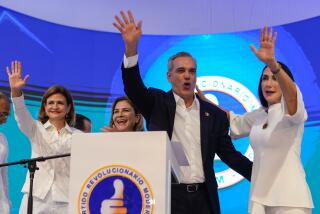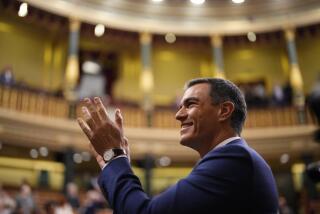Uribe’s Second Term Is a First
BOGOTA, Colombia — President Alvaro Uribe swept to a reelection victory Sunday as voters gave him a resounding vote of confidence for having reduced violence and reignited the economy, and for restored confidence in a nation that four years ago seemed on the verge of disintegration.
With 96% of the votes counted, Uribe had 62%, a massive lead over the closest of his three main rivals, the Alternative Democratic Pole’s Carlos Gaviria, with 22%. Gaviria conceded the race, in effect making Uribe the nation’s first president to be democratically elected to a second term.
Uribe’s followers in Congress had the constitution changed last year to allow him to become the first modern Colombian president to run for reelection.
“We have to construct a truly secure nation. A secure country is one that guarantees liberties,” Uribe told a cheering crowd at a victory speech in a downtown hotel. “Terrorism has wanted to destroy them. Democratic security has tried to recover the liberties that terrorism has wanted to destroy.”
Uribe ran on a promise to continue the fight against guerrilla armies, the largest of which, the Revolutionary Armed Forces of Colombia, or FARC, has opposed the government in a four-decade-old civil war. The improved security under Uribe’s term has been financed partly by Plan Colombia, the U.S. foreign aid package that has funneled more than $600 million annually to Colombia since 2000.
Plan Colombia dollars have enabled Uribe to expand the number of uniformed military and police by a third, to about 400,000, since he took office in 2002. Some of the aid has gone to financing the demobilization of about 30,000 right-wing paramilitary units. Since 2002, killings are down by a third and kidnappings are down by two-thirds.
Human rights groups have criticized Uribe for allegedly favoring the paramilitary groups in the peace process. But a visiting senior U.S. State Department official this week said Uribe had little choice but to offer them generous terms in exchange for laying down their arms.
“What’s the alternative?” the official asked. “The alternative is no process.”
Sunday’s results were better than many expected for Uribe, and came despite a light turnout of about 45%, which supporters feared would hurt him. Uribe did best in urban areas, where, before his election in 2002, guerrilla advances and terrorist strikes had prompted about 1 million middle- and upper-class citizens to flee the country.
Voters from varied demographic backgrounds interviewed as they left polling places here Sunday morning said they were enthusiastic Uribistas. “Onward, Mr. President,” retired public official Julio Pinero, 77, said as he left polls in the impoverished July 20 neighborhood.
“People sense that the country has gone forward and know enough not to be fooled by bright colors and promises,” Pinero said. “It has cost a lot of work and higher taxes, but it’s for our own good. The president should be allowed to finish his plan.”
Uribe’s victory came despite his notice to Colombians in March that he would raise taxes on the wealthiest to back purchases of equipment for the army.
In remarks to reporters Saturday, Uribe, a bookish and plain-spoken Oxford-educated lawyer who once took law classes from Gaviria, denied suggestions that he might seek a third term. Several voters said Sunday that they would support him again.
“He’s been called to govern,” said Mercedes Mora, a 63-year-old housewife. “He can end the war if we support him.”
A minority of voters said Uribe had neglected the poor and become increasingly authoritarian.
“If you protest, he paints you as a communist or a criminal,” said teacher Nora Casas, 57, who said she voted for Gaviria.
More to Read
Sign up for Essential California
The most important California stories and recommendations in your inbox every morning.
You may occasionally receive promotional content from the Los Angeles Times.










